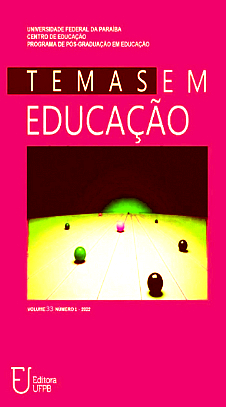Protagonismos e escolhas na educação
DOI:
https://doi.org/10.22478/ufpb.2359-7003.2024v33n1.68546Keywords:
juventudes, protagonismo, currículoAbstract
Terms such as "youth protagonism" and "student as protagonist," found in the National Common Curricular Base and state curricula, hold significant discursive relevance and are widely used in political and media contexts. An analysis of data on the offering of new curricular components in Minas Gerais schools during the implementation of the New High School shows that the flexibility and protagonism aimed at in normative documents and public and private sector advertising are fundamentally dependent on teacher qualification. While the new educational model requires greater interaction between teachers and students, particularly in the use of new methodologies and pedagogical strategies, this article highlights a discursive imbalance that does not hold up in school practice, given that student protagonism is inseparably linked to teacher protagonism, their training, and working conditions.
Downloads
References
ARROYO, M. G. Imagens quebradas: trajetórias e tempos de alunos e mestres. 7ª Edição. Petrópolis, RJ: Editora Vozes, 2012.
BRASIL. Ministério da Educação. Novo Ensino Médio - perguntas e respostas. Disponível em: http://portal.mec.gov.br/component/content/article?id=40361. Acesso em: 21 out. 2023.
BRASIL. Base Nacional Comum Curricular (BNCC): educação é a base. Brasília, DF: MEC/CONSED/UNDIME, 2018. Disponível em: http://basenacionalcomum.mec.gov.br/images/BNCC_EI_EF_110518_versaofinal_site.pdf. Acesso em 05/06/2022.
MINAS GERAIS. Catálogo de Eletivas. Secretaria de Estado de Educação, Minas Gerais, 2021. Disponível em: https://drive.google.com/file/d/1U1669uoP-UPeivb0OUmSMn1glyfO5QtW/view. Acesso em 05/06/2022
MINAS GERAIS. Currículo Referência do Estado de Minas Gerais na etapa do Ensino Médio. Secretaria de Estado de Educação, Minas Gerais, 2021.Disponível em: https://www2.educacao.mg.gov.br/images/documentos/Curr%C3%ADculo%20Refer%C3%AAncia%20do%20Ensino%20M%C3%A9dio.pdf. Acesso em 05/06/2022.
MINAS GERAIS. Devolutiva dos resultados do questionário de escuta para um novo ensino médio. Secretaria de Estado de Educação, Minas Gerais, 2021. Disponível em: https://drive.google.com/file/d/1S34HVzXIerVMID7AxAL40wL7E9gl8zw3/view?usp=sharing . Acesso em 30/03/2023
MINAS GERAIS. Diretrizes curriculares para implementação do novo ensino médio nas turmas de 1o ano em 2022.Secretaria de Estado de Educação, Minas Gerais, 2021. Disponível em: https://drive.google.com/file/d/1IiGCbFYfGhm6opDRXAWSVUOw9cd2OtQ4/view. Acesso em: 05/06/2022.
BRASIL. Ministério da Educação/Gabinete do Ministro. Portaria nº 1.432, de 28 de dezembro de 2018. Estabelece os referenciais para elaboração dos itinerários formativos conforme preveem as Diretrizes Nacionais do Ensino Médio. Diário Oficial da União, Brasília, DF, ed. 66, seção 1, p. 94, 05 abr. 2019. Disponível em: https://www.in.gov.br/materia/-/asset_publisher/Kujrw0TZC2Mb/content/id/70268199. Acesso em 15/10/2023
O GLOBO. Após reforma do ensino médio, alunos têm aulas de 'O que rola por aí', 'RPG' e 'Brigadeiro caseiro'. O Globo, Brasil, 13 fev. 2023. Disponível em: https://oglobo.globo.com/brasil/noticia/2023/02/aula-de-rpg-ou-de-cuidados-com-o-pet-professores-e-pais-criticam-disciplinas-inusitadas-do-novo-ensino-medio.ghtml. Acesso em: 21 out. 2023.
Downloads
Published
How to Cite
Issue
Section
License
Copyright (c) 2024 Revista Temas em Educação

This work is licensed under a Creative Commons Attribution 4.0 International License.
Authors who publish in this journal agree to the following terms:
. Authors retain the copyright and grant the journal the right to first publication, with the work simultaneously licensed under the Licença Creative Commons Attribution that allows the sharing of the work with acknowledgment of authorship and initial publication in this magazine. . Authors are authorized to assume additional contracts separately, for non-exclusive distribution of the version of the work published in this journal (eg, publishing in institutional repository or as a book chapter), with acknowledgment of authorship and initial publication in this journal.
. Authors are permitted and encouraged to publish and distribute their work online (eg in institutional repositories or on their personal page) at any point before or during the editorial process, as this can generate productive changes, as well as increase impact and citation of the published work (See O Efeito do Acesso Livre).



















